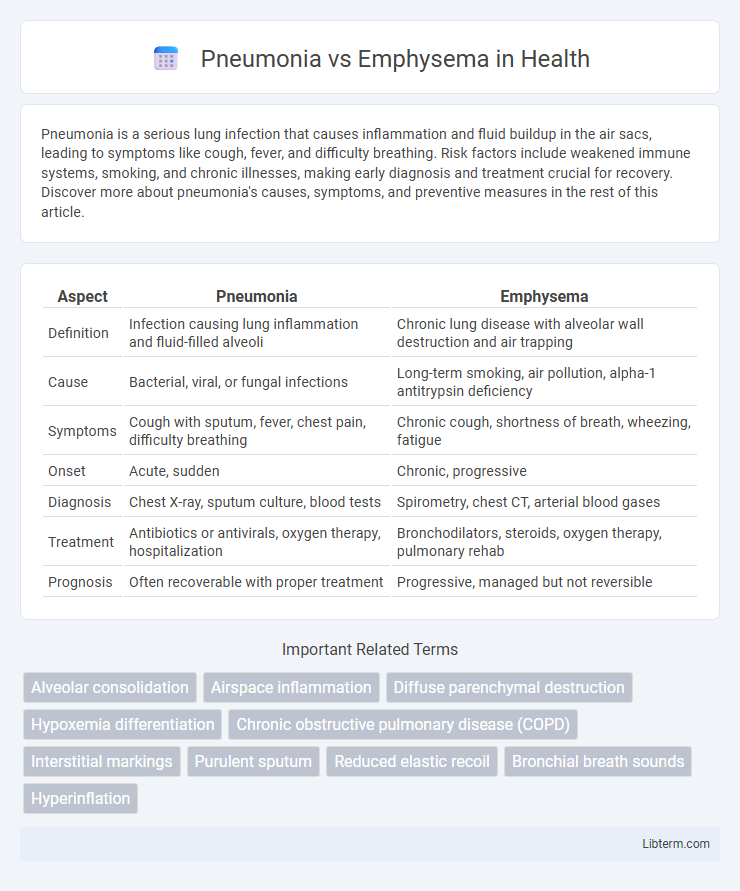Pneumonia is a serious lung infection that causes inflammation and fluid buildup in the air sacs, leading to symptoms like cough, fever, and difficulty breathing. Risk factors include weakened immune systems, smoking, and chronic illnesses, making early diagnosis and treatment crucial for recovery. Discover more about pneumonia's causes, symptoms, and preventive measures in the rest of this article.
Table of Comparison
| Aspect | Pneumonia | Emphysema |
|---|---|---|
| Definition | Infection causing lung inflammation and fluid-filled alveoli | Chronic lung disease with alveolar wall destruction and air trapping |
| Cause | Bacterial, viral, or fungal infections | Long-term smoking, air pollution, alpha-1 antitrypsin deficiency |
| Symptoms | Cough with sputum, fever, chest pain, difficulty breathing | Chronic cough, shortness of breath, wheezing, fatigue |
| Onset | Acute, sudden | Chronic, progressive |
| Diagnosis | Chest X-ray, sputum culture, blood tests | Spirometry, chest CT, arterial blood gases |
| Treatment | Antibiotics or antivirals, oxygen therapy, hospitalization | Bronchodilators, steroids, oxygen therapy, pulmonary rehab |
| Prognosis | Often recoverable with proper treatment | Progressive, managed but not reversible |
Introduction to Pneumonia and Emphysema
Pneumonia is an acute respiratory infection characterized by inflammation of the air sacs in the lungs, often caused by bacteria, viruses, or fungi, leading to symptoms such as cough, fever, and difficulty breathing. Emphysema, a chronic obstructive pulmonary disease (COPD), involves the gradual destruction of alveoli, resulting in reduced respiratory function and shortness of breath. Both conditions significantly impact lung health but differ in their underlying causes, progression, and treatment approaches.
Definition and Overview
Pneumonia is an acute respiratory infection characterized by inflammation of the alveoli, caused by bacteria, viruses, or fungi, leading to symptoms such as cough, fever, and difficulty breathing. Emphysema is a chronic lung disease and a type of chronic obstructive pulmonary disease (COPD) marked by damage to the alveoli walls, resulting in reduced elasticity and impaired airflow. While pneumonia involves infection and inflammation, emphysema primarily involves progressive tissue destruction and impaired gas exchange.
Causes and Risk Factors
Pneumonia is primarily caused by bacterial, viral, or fungal infections leading to inflammation of the lungs, with risk factors including age extremes, weakened immune systems, and chronic illnesses. Emphysema results from long-term exposure to airborne irritants such as cigarette smoke, air pollution, and chemical fumes, causing damage to the alveoli and decreased lung elasticity. Smoking remains the most significant risk factor for emphysema, while pneumonia risk increases with conditions like chronic obstructive pulmonary disease (COPD) and recent respiratory infections.
Symptoms Comparison
Pneumonia symptoms typically include high fever, chills, productive cough with green or rust-colored sputum, and sharp chest pain that worsens with deep breathing or coughing. Emphysema primarily presents with shortness of breath, chronic cough with minimal sputum, wheezing, and a barrel-shaped chest due to lung hyperinflation. While both conditions cause respiratory distress, pneumonia features acute inflammatory signs and systemic infection symptoms, whereas emphysema involves progressive airway obstruction and lung tissue damage.
Pathophysiology Differences
Pneumonia involves inflammation of the alveoli due to infection, leading to fluid accumulation that impairs gas exchange. Emphysema is characterized by the destruction of alveolar walls and loss of elastic recoil, resulting in enlarged air spaces and reduced surface area for oxygen diffusion. These pathophysiological differences cause pneumonia to present with acute respiratory symptoms, while emphysema results in chronic airflow limitation.
Diagnostic Approaches
Diagnostic approaches for pneumonia typically involve chest X-rays to identify lung infiltrates, sputum cultures to detect causative bacteria, and blood tests measuring white blood cell count and inflammatory markers. Emphysema diagnosis relies heavily on pulmonary function tests such as spirometry, which assesses airflow obstruction and lung volume changes, alongside high-resolution computed tomography (HRCT) scans to detect alveolar wall damage and air trapping. Both conditions may require arterial blood gas analysis to evaluate oxygenation and carbon dioxide retention levels.
Treatment Options
Pneumonia treatment typically involves targeted antibiotic therapy based on the causative bacterial agent, alongside supportive care such as oxygen supplementation and hydration. Emphysema management centers on bronchodilators, corticosteroids, pulmonary rehabilitation, and supplemental oxygen to improve lung function and reduce symptoms. Advanced emphysema cases may require surgical interventions like lung volume reduction surgery or lung transplantation.
Complications and Prognosis
Pneumonia can lead to severe complications such as pleural effusion, lung abscess, and sepsis, significantly impacting patient mortality rates, especially in immunocompromised individuals and the elderly. Emphysema, a form of chronic obstructive pulmonary disease (COPD), often results in progressive respiratory failure, pulmonary hypertension, and cor pulmonale, deteriorating long-term lung function and quality of life. Prognosis for pneumonia improves with timely antibiotic treatment, whereas emphysema has a chronic, irreversible course with management centered on symptom relief and slowing disease progression.
Prevention Strategies
Effective prevention strategies for pneumonia include vaccination against pneumococcal bacteria and influenza, maintaining good hygiene, and avoiding smoking to reduce respiratory infections. Emphysema prevention primarily revolves around smoking cessation, minimizing exposure to environmental pollutants, and using protective equipment in high-risk workplaces. Regular medical check-ups help in early detection and management of both conditions to prevent complications.
Living with Chronic Lung Diseases
Managing chronic lung diseases like pneumonia and emphysema requires tailored strategies to improve quality of life and lung function. Pneumonia, an acute infection causing inflammation in the lungs, often demands antibiotics and rest, while emphysema, a progressive condition characterized by damaged alveoli and reduced airflow, benefits from long-term treatments such as bronchodilators, pulmonary rehabilitation, and oxygen therapy. Lifestyle adjustments including quitting smoking, regular exercise, and avoiding pollutants are crucial in both conditions to minimize symptoms and prevent exacerbations.
Pneumonia Infographic

 libterm.com
libterm.com